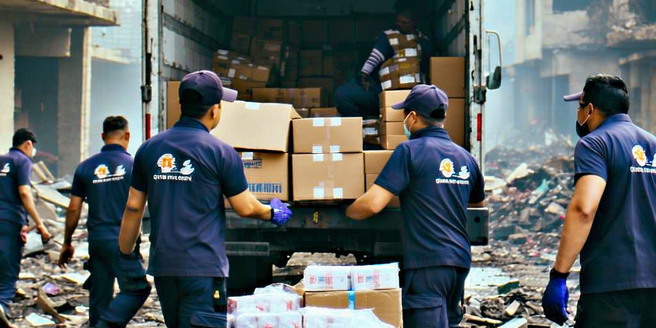
Understanding the Role of Volunteers in Times of Crisis
Volunteers play a crucial role in disaster response and recovery, offering their time, skills, and compassion to support affected communities. During crises, volunteers provide immediate assistance, such as distributing essential supplies, offering medical aid, and helping with rescue operations. They also contribute to long-term recovery efforts by participating in rebuilding projects and supporting mental health initiatives. Across the globe, volunteer organizations collaborate with local agencies, governments, and international partners to ensure an effective and coordinated response. Their presence not only alleviates the burden on professional responders but also fosters a sense of solidarity and hope among impacted populations. Understanding the responsibilities and expectations of volunteer work during disasters is essential for those wishing to contribute effectively.
Preparing for Volunteer Work in Disaster Zones
Embarking on volunteer work in disaster zones requires thorough preparation. Before deployment, it is critical to have a clear understanding of the environment and potential challenges you might face. Attending disaster readiness workshops and training sessions can equip volunteers with necessary skills, such as first aid and crisis communication. It’s also important to assess personal strengths and limitations to engage in roles that match your abilities. Health precautions, such as vaccinations and personal protective gear, are vital for safeguarding oneself while assisting affected communities. Preparing emotionally by building resilience and coping strategies is equally crucial in managing the psychological impact of disaster response. Finally, understanding the local culture and fostering open communication with community members can enhance collaboration and respect during your volunteer efforts.
Types of Volunteer Opportunities Available
There is a diverse range of volunteer opportunities available during disasters, each addressing different needs. Urgent roles include search and rescue, where volunteers assist in locating and saving individuals trapped or in danger. Medical volunteers provide essential care to the injured and support healthcare facilities overwhelmed by the crisis. Logistical roles, such as managing supply chains and distributing aid, are crucial for maintaining operations. Volunteers also help in setting up temporary shelters and ensuring the well-being of displaced persons. Furthermore, skilled volunteers may offer specialized services like psychological support, legal assistance, or technical expertise. Those with proficiency in construction can participate in rebuilding efforts. Understanding the variety of roles available helps volunteers choose positions that align with their skills and interests, maximizing their impact on recovery efforts.
How to Choose the Right Volunteer Organization
Selecting the right volunteer organization can significantly enhance your disaster response experience and impact. Begin by researching organizations that align with your values and interests, whether they focus on medical aid, infrastructure rebuilding, or community support. Evaluate the organization’s reputation by examining their track record in previous disaster responses and seeking testimonials from past volunteers. Assess the level of training and support they offer to ensure you are adequately prepared and supported. It’s important to understand their coordination with local authorities and other agencies, which can indicate their efficacy in disaster scenarios. Additionally, verify the transparency of their operations and how they utilize resources and donations. By choosing a reputable and well-structured organization, you can ensure that your efforts will be both effective and rewarding.
The Impact of Volunteer Efforts on Disaster Recovery
Volunteer efforts are instrumental in accelerating disaster recovery and rebuilding community resilience. Their contributions address immediate needs, such as providing food, shelter, and medical care, which are crucial for survival and stability. Beyond the immediate impact, volunteers foster a sense of hope and solidarity, encouraging communities to rebuild and look towards the future. In rebuilding phases, volunteers participate in constructing homes, restoring infrastructure, and regenerating livelihoods, which are vital for long-term recovery. Furthermore, volunteers often bring diverse skills and perspectives, promoting innovative solutions to complex problems faced by affected communities. By supplementing the work of official agencies, their efforts aid in minimizing the social and economic fallout of disasters, helping communities recover faster and more sustainably.
Tips and Resources for Aspiring Disaster Volunteers
Aspiring disaster volunteers should start by educating themselves on the nature of disaster response work and its demands. Enrolling in training programs, such as first aid, crisis management, and trauma support, can provide essential skills needed on the ground. Building a network with experienced volunteers and professionals can offer valuable insights and mentorship. Staying informed about current global disasters and understanding cultural sensitivities is crucial for effective collaboration in diverse settings. Utilizing online platforms and volunteer databases can connect you with reputable organizations and opportunities. Additionally, maintaining physical and mental health through self-care practices ensures you can perform effectively. Remember to always prioritize safety and align your involvement with your capabilities and expertise to make a meaningful impact while volunteering.
